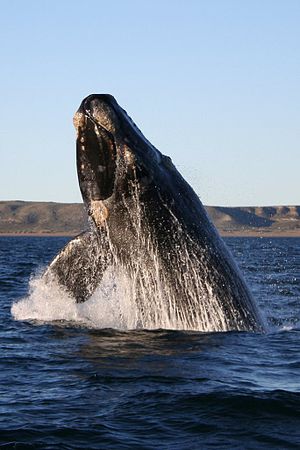Whale
| Whales | |
|---|---|
| Whales are not a taxon, they are an informal grouping of the infraorder Cetacea | |

Southern right whale
|
|
| Information | |
| Classification of Cetacea |
|
| Families considered whales |
|
Whales are a widely distributed and diverse group of fully aquatic placental marine mammals. They are an informal grouping within the infraorder Cetacea, usually excluding dolphins and porpoises. Whales, dolphins and porpoises belong to the order Cetartiodactyla with even-toed ungulates and their closest living relatives are the hippopotamuses, having diverged about 40 million years ago. The two parvorders of whales, baleen whales (Mysticeti) and toothed whales (Odontoceti), are thought to have split apart around 34 million years ago. The whales comprise eight extant families: Balaenopteridae (the rorquals), Balaenidae (right whales), Cetotheriidae (the pygmy right whale), Eschrichtiidae (the gray whale), Monodontidae (belugas and narwhals), Physeteridae (the sperm whale), Kogiidae (the dwarf and pygmy sperm whale), and Ziphiidae (the beaked whales).
Whales are creatures of the open ocean; they feed, mate, give birth, suckle and raise their young at sea. So extreme is their adaptation to life underwater that they are unable to survive on land. Whales range in size from the 2.6 metres (8.5 ft) and 135 kilograms (298 lb) dwarf sperm whale to the 29.9 metres (98 ft) and 190 metric tons (210 short tons) blue whale, which is the largest creature that has ever lived. The sperm whale is the largest toothed predator on earth. Several species exhibit sexual dimorphism, in that the females are larger than males. Baleen whales have no teeth; instead they have plates of baleen, a fringe-like structure used to expel water while retaining the krill and plankton which they feed on. They use their throat pleats to expand the mouth to take in huge gulps of water. Balaenids have heads that can make up 40% of their body mass to take in water. Toothed whales, on the other hand, have conical teeth designed for catching fish or squid. Baleen whales have a well developed sense of "smell", whereas toothed whales have well-developed hearing − their hearing, that is adapted for both air and water, is so well developed that some can survive even if they are blind. Some species, such as sperm whales, are well adapted for diving to great depths to catch squid and other favoured prey.
...
Wikipedia
